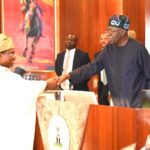By Amofokhai Williams
The Economic and Financial Crimes Commission (EFCC) has recorded unprecedented achievements in the past two years under the leadership of its Executive Chairman, Mr. Ola Olukoyede, recovering over ₦566 billion, $411 million, and 1,502 properties linked to economic and financial crimes.
Olukoyede made this known on Thursday, during a press briefing at the EFCC headquarters in Abuja to mark his second anniversary in office.
Speaking through the Director of Public Affairs, Commander Wilson Uwujaren, the EFCC Chairman said the Commission had achieved “historic progress” since he assumed office on October 18, 2023, following his confirmation by the Senate.
According to him, between October 2023 and September 2025, the EFCC received over 19,000 petitions, conducted 29,240 investigations, filed 10,525 cases, and secured 7,503 convictions across the country.
Within the same period, the Commission recovered ₦566,319,820,343.40, $411,566,192.32, £71,306.25, €182,877.10, and other currencies.
It also recovered 1,502 non-monetary assets, including 402 properties in 2023, 975 in 2024, and 125 in 2025.
Olukoyede cited two major recoveries, the final forfeiture of 753 duplexes in Lokogoma, Abuja, and the forfeiture of Nok University, which has now been renamed the Federal University of Applied Sciences, Kachia, Kaduna State, as examples of the Commission’s intensified asset recovery drive.
“These recoveries are tangible evidence of our renewed focus on tracing, confiscating, and returning illicit assets to the Nigerian state and victims of fraud,” he said.
Olukoyede listed several high-profile prosecutions during the period, including cases involving former governors Willie Obiano, Abdulfatah Ahmed, Darius Ishaku, Theodore Orji, and Yahaya Bello. Others include former ministers Olu Agunloye, Mamman Saleh, Hadi Sirika, Charles Ugwu, and former Central Bank Governor Godwin Emefiele.
He also revealed that in December 2024, the EFCC arrested 792 suspects for investment and cryptocurrency fraud in Lagos, including 192 foreigners, all of whom were prosecuted and deported.
“This sent a strong signal that Nigeria will not be a haven for cybercriminals,” he stated.
The EFCC Chairman added that several longstanding corruption cases had been reopened, including those involving Fred Ajudua, former PDP Chairman Haliru Bello Mohammed, former National Security Adviser Sambo Dasuki, and ex-NSITF boss Ngozi Olojeme.
Olukoyede disclosed that part of the recovered funds had been channelled into key national initiatives such as the Students Loan Scheme and Consumer Credit Scheme, with a total of ₦100 billion invested. Other agencies, including the Niger Delta Development Commission (NDDC), AMCON, FIRS, and NHIA, have also benefited from recovered funds.
“Some recovered properties have been allocated to government agencies for use as offices, in line with our commitment to ensuring recovered assets are put to productive use,” he said.
He further highlighted the establishment of a Task Force on Naira Abuse and Dollarisation of the Economy, which he said had made significant impact in sanitising financial transactions and curbing currency abuse nationwide.
Olukoyede reaffirmed the EFCC’s commitment to accountability, transparency, and institutional reform, vowing that under his leadership, the Commission would continue to strengthen Nigeria’s fight against corruption and economic crimes with greater efficiency and integrity.







